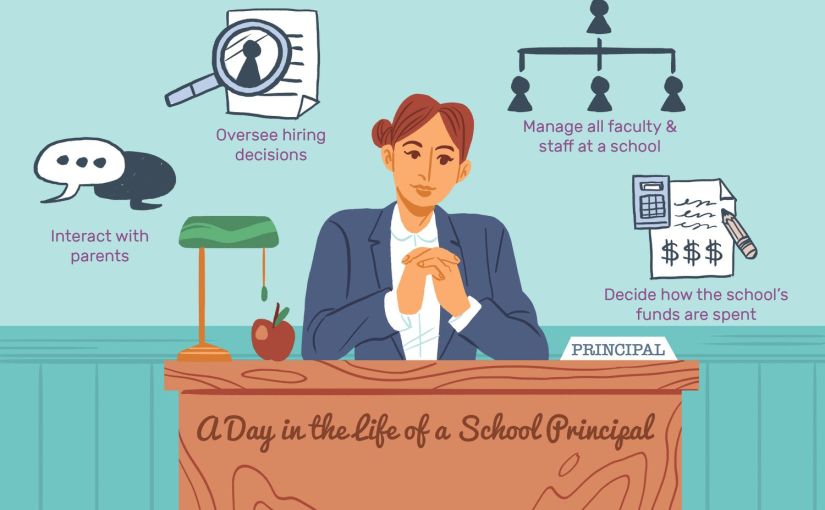It’s that season when the newness of the school year has worn off and the workload has become almost unbearable. Possibly because, as usual, I’ve committed to absolutely everything. On top of teaching full time, I’ve joined the districtwide Labor Management Collaboration Committee and, after our October meeting, I volunteered to organize a happy hour for 300+ English Language teachers. This is on top of my monthly Building Rep duties as a member of the teachers’ union.
This is an election year, teachers are working without a contract, and we’ve filed an Unfair Labor Practice against the school district for refusing to come to the bargaining table. The union needs to share our proposals before the Board of Education votes on next year’s budget. My role is to communicate to the teachers at my school what is happening with issues that directly impact them, and to rally their support when needed. Like wearing Red for Ed(ucation), marching to the Board offices, and handing out Apple Ballots at the Early Voting Centers. 🍎
That’s the easy part. I’m a natural activist.
I’ve co-authored a section of a White Paper for the Community WELL group, and now need to review the document before they send it to the Maryland State Board of Education. What if I’m wrong about EOY? What if that factoid that the ACLU guy popped out comes back to haunt me? Can I own it? Speaking up for students has already earned me a reprimand from my supervisor this month. Part of me thinks what have I got to lose? I’m close to retirement and part of me dreads signing my name to such a high-stakes document.
Teachers are often so afraid to speak up that I feel compelled to do it for them.
Call me crazy, but I’ve signed up for National Board Certification – all four components in one year! People have told me it’s like being in grad school. I’m taking a support class for Component Three, “Teaching Practice and Learning Environment.” I have to videotape different lessons and write a four-page paper reflecting my knowledge of students, my knowledge of English Language Acquisition, and Instructional Practice. I’m the oldest teacher in the room. I’d love to say I’m putting myself through this torture to become a better practitioner. Honestly, I’m doing it for the money. I get a significant salary boost that figures into my retirement income.
I’d be a fool to walk away from this opportunity.
Because I am a teacher of English Language Learners, I’ve got to complete the mandated paperwork: Photocopy Parent Notification Letters and English Learner Accommodations forms – pink ones for the students to keep in their binders so that they can advocate for themselves in their content classes – and white ones to send home. Go over the signature lines with a highlighter and staple the two docs together so that students won’t forget one at home. I might as well send home the video release forms for National Boards at the same time. I’ve got to monitor who’s returned the forms and motivate them to get them in ASAP. Then I have to file them in a manila folder in the office filling cabinet.
Teachers of English Learners have extra outdated, onerous duties that other teachers do not have to worry about.
The last weekend of October is a No Homework weekend so that seniors can work on their college applications – the ones that are due November 1st. The University of Maryland admits 94% of its freshman class from those early applications so it’s crunch time. My immigrant students didn’t get the message that counselors need a month’s notice to write a recommendation and send out transcripts. I’m encouraging them to send the application in anyway. And to pick a few other schools, including Montgomery College, an excellent community college, as a safety school.
Helping newcomer English Learners with college applications is intrinsically rewarding.
Melani asked me on Friday after the bell rang if I could write her a recommendation – due Monday. Of course! I said. She was briefly in my class in 9th grade, again in 10th grade, and now she’s in my co-taught Honors English 12 class. I love that girl! In spite of family problems, she comes to school ready to learn, she works hard, and she is the most positive and optimistic student I know. Last year – the only year she was not my student, she used to stop by and greet me with a twinkle in her eye (we were masked all year) and ask how my day was going. She seemed genuinely concerned about my response. Melani would make a great nurse or social worker. She’s that kind of caring. She probably already has a million certificates, but I think I’ll nominate her for Student of the Month again.
Students like Melani deserve every bit of after-school support that I can spare.
Stacks of ungraded Triple Entry Logs sit on the dining room table. I have to check the reading notes and compare what they wrote to my clipboard checks indicating what they said before entering their grades for the Literature Circle discussion. Then I have to post next week’s assignment online because I’ll be out all day Tuesday for Professional Development. I can’t forget to enter their Common Writing Task scores into the Performance Matters system so that district bureaucrats can track our Evidence of Learning, which is a state measure for student success. I can’t remember when the deadline is.
I knew this would happen.
My to-do list has gotten impossibly long. How will I ever find enough time to complete all the work?! I keep reminding myself: This is the career I chose. These are tasks that I love. I’ve gotten exactly the courses that I requested. I love my school. But it is already overwhelming. And it’s not even the end of Marking Period 1 yet.
There’s never so much to do that I can’t write my way out of doing it. 😁







